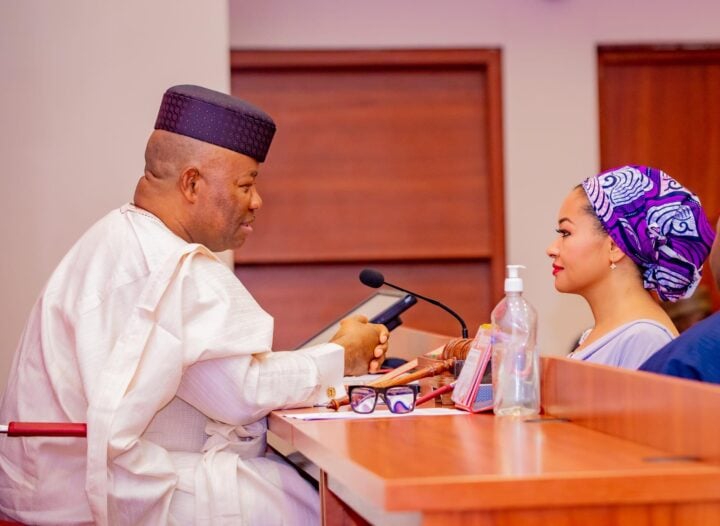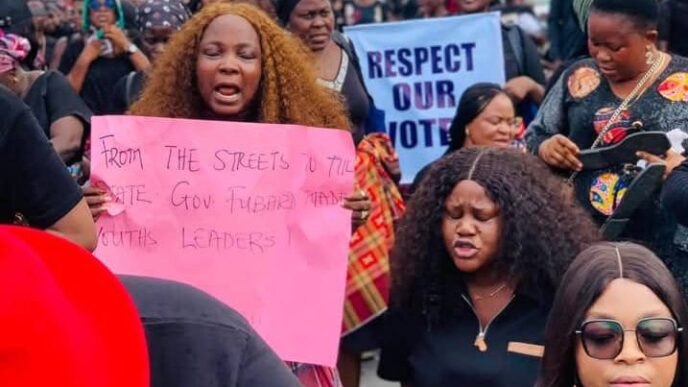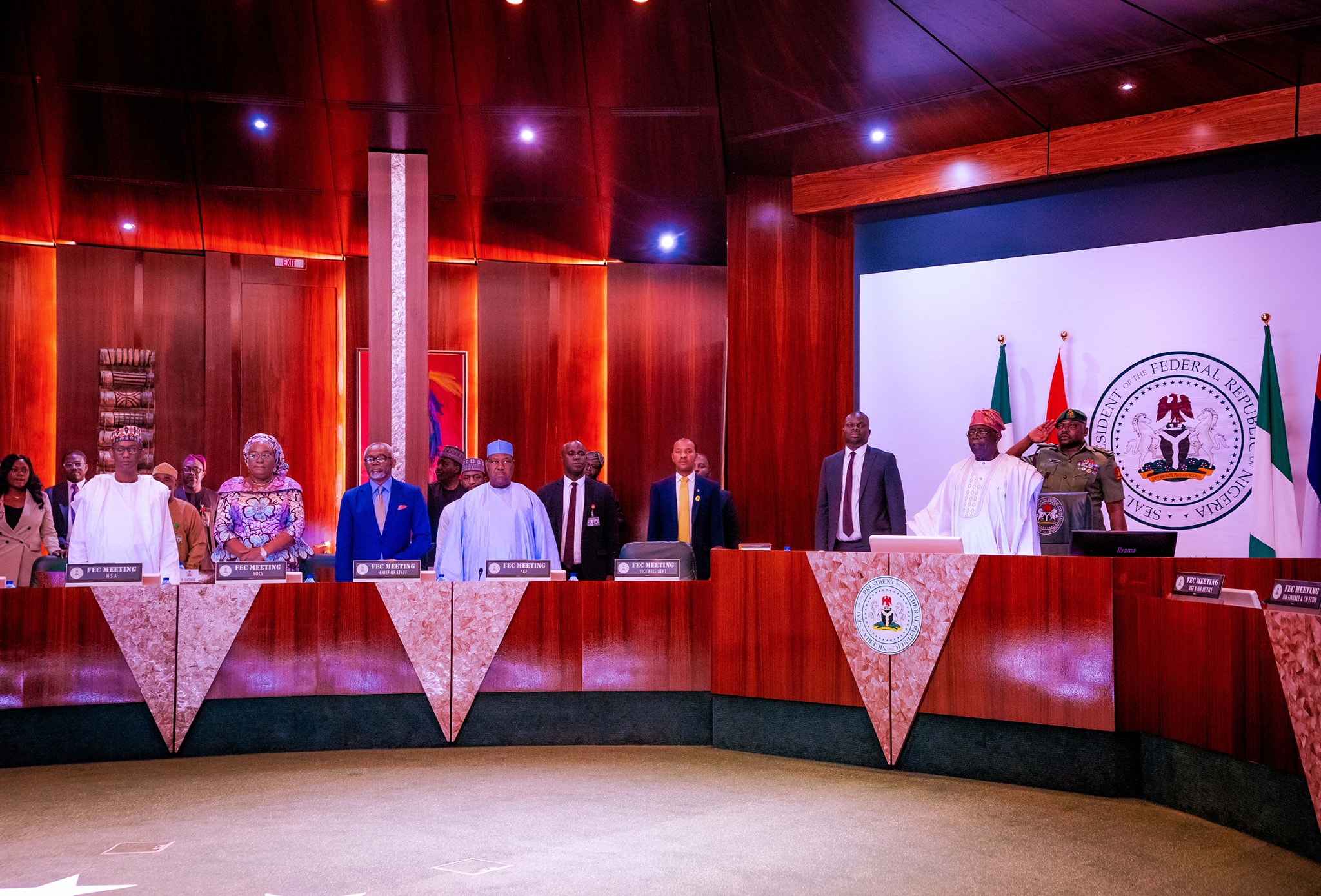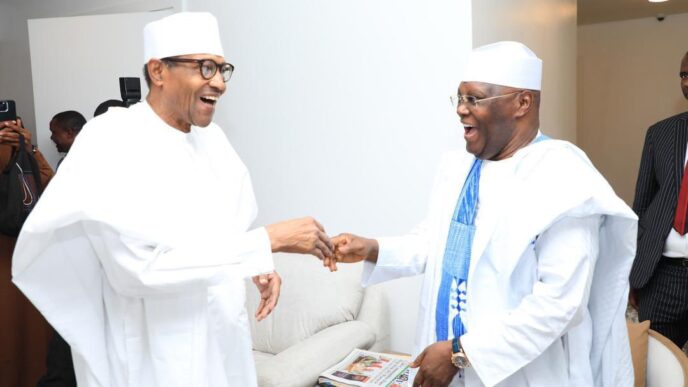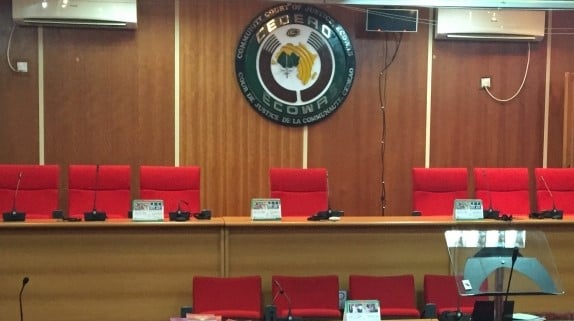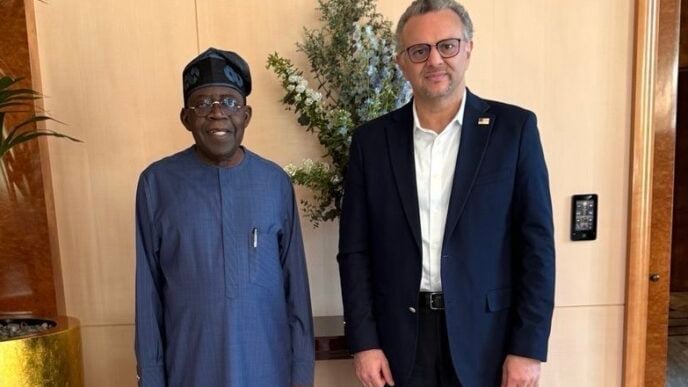L-R: File photo of Senate President Godswill Akpabio and Natasha Akpoti-Uduaghan
The rift between Senate President Godswill Akpabio and Natasha Akpoti-Uduaghan, senator representing Kogi central, has dominated headlines for over six weeks.
The dispute, marked by allegations of sexual harassment, defamation, and procedural disputes within the senate, has ignited national debates on gender dynamics, legislative ethics, and the treatment of women in politics.
ALLEGATIONS AND COUNTER-ALLEGATIONS
The hostility became public in February when Akpoti-Uduaghan accused Akpabio of making unwelcome sexual advances toward her.
Advertisement
She claimed the incidents occurred at his office and his residence in Akwa Ibom state.
The allegation came in the wake of her seating arrangement altercation with Akpabio at the red chamber
“Mine is the case of a student being punished by a lecturer for refusing to sleep with him,” Akpoti-Uduaghan told Arise TV.
Advertisement
In response, Akpabio denied the allegations, saying he has never sexually harassed any woman.
“At no time did I ever attempt any sexual harassment on the said distinguished Senator Akpoti-Uduaghan or any other woman for that matter,” Akpabio said on March 5 while addressing his colleagues.
A day later, the senate suspended Akpoti-Uduaghan after its ethics committee accused her of misconduct, including speaking without permission and making critical comments about its leaders.
She was barred from accessing her office and had her allowances and security details withdrawn.
Advertisement
LEGAL BATTLES AND PUBLIC OUTCRY
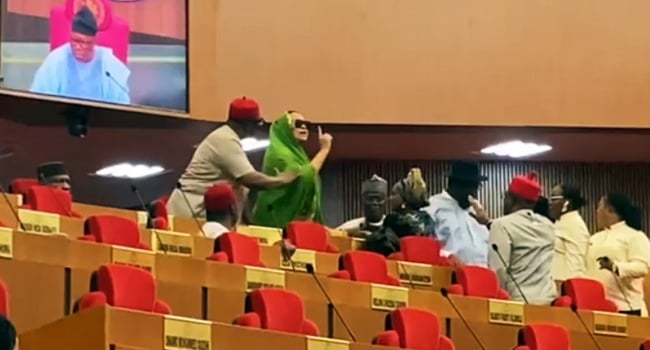
The conflict extended beyond the chambers.
Akpoti-Uduaghan filed a lawsuit against Akpabio for allegedly defaming her. The suit was filed before the federal capital territory high court with Akpabio and his senior legislative aide, Mfon Patrick, listed as the second and third defendants.
In the suit, Akpoti-Uduaghan, through her lawyer, Victor Giwa, referred to Akpabio’s words published by his aide on his Facebook page with the title “Is local content committee of the senate Natasha’s birthright?”, where he stated that the claimant thought being a lawmaker is all about pancaking her face and wearing transparent outfits to the chambers.
Advertisement
In response, Ekaette Akpabio, the wife of the senate president, filed multiple lawsuits against Akpoti-Uduaghan, seeking N250 billion in damages for alleged defamation.
She said the senator’s comments caused emotional and psychological distress to her family and demanded public apologies published in national newspapers.
Advertisement
Interestingly, both families maintained a cordial relationship outside the senate before the fallout.
INTERNATIONAL DIMENSION
Advertisement
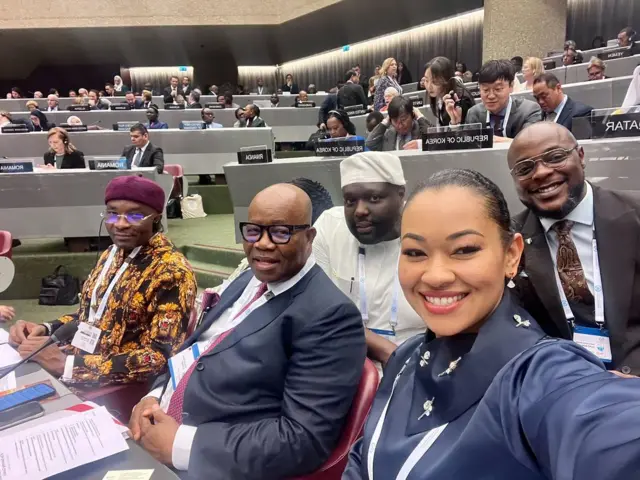
The dispute garnered international attention when Akpoti-Uduaghan addressed the Inter-Parliamentary Union (IPU) conference in New York, alleging that her suspension was a direct consequence of her accusations against Akpabio.
“This is a clear case of political victimisation, punishment for speaking out against impunity, corruption, and gender-based violence,” she told the global organisation of national parliaments.
Advertisement
The Kogi central senator also granted interviews to BBC, Sky News, and Deutsche Welle — a move seen as an international PR campaign against the senate leadership.
“I found the courage to speak up. Yes, the breaking point was moving me from that seat. Silently, I have had to endure a whole lot,” she told Sky News.
“Things got difficult for me. I was always complaining.
“I’ll have a motion to pass and he’ll not let me. My husband would walk to him because they are friends and say ‘my wife has a very important bill; her constituency needs this. Why don’t you give her a chance to speak?’ and he’ll say, ‘next time’.
“Each time I walk to him alone, he’ll tell me, ‘You know what, right here, I’m the chief presiding officer of the national assembly, so you have to please me, make me happy to get these privileges’.
“That happened several times, and because I refused, it developed into malice.”
INITIATION OF RECALL PROCESS
In mid-March 2025, a faction of Akpoti-Uduaghan’s constituents from Kogi central commenced a recall process against her.
On Thursday, the Independent National Electoral Commission (INEC) announced that the petition seeking to recall Akpoti-Uduahan failed to meet the constitutional threshold.
INEC cited section 69(a) of the 1999 constitution (as amended), which outlines the conditions for recalling a lawmaker, noting that the petition failed to fulfil these requirements.
“The petition for the recall of Senator Natasha Akpoti-Uduaghan, representing Kogi central senatorial district, has NOT met the requirement of the Constitution of the Federal Republic of Nigeria 1999 (as amended),” the statement signed by Rose Oriaran-Anthony, secretary to the commission, read.
“The petition was signed by 208,132 out of 474,554 registered voters in the constituency. This represents 43.86% as against the constitutional requirement of at least 50%+1 persons registered to vote in the constituency.”
COURT RULING ON MEDIA ENGAGEMENTS
On Friday, a federal high court in Abuja issued an order restraining all parties involved in the suit filed by Akpoti-Uduaghan against Akpabio and three others from speaking to the press about matters related to the case.
Binta Nyako, the presiding judge, issued the order following a complaint by Kehinde Ogunwumiju, lawyer to Akpabio, that the plaintiff (Akpoti-Uduaghan) had been appearing on various television stations to discuss the ongoing suit.
In a brief ruling, Justice Nyako directed that all parties and their lawyers must refrain from granting press interviews related to the case.
She also prohibited the streaming of court proceedings on social media platforms.
Nyako’s ruling appears to have drawn a temporary curtain on the protracted feud between Akpabio and Akpoti-Uduaghan.
However, for many observers, the damage may already have been done. The public nature of the accusations and counter-accusations has not only deepened political fault lines but also exposed the senate to scrutiny over its internal processes and how it handles dissent, especially involving female lawmakers.
The feud has also reignited conversations around the treatment of women in Nigerian politics, with many arguing that Akpoti-Uduaghan’s ordeal reflects a general culture of silencing and sidelining vocal female politicians.
When everyone thought the court’s gag order would lead to a ceasefire and reduce the tension, Akpabio petitioned Kayode Egbetokun, the inspector-general of police, over the assassination allegation levelled against him by Akpoti-Uduaghan.
Akpabio is seeking an immediate investigation and prosecution of Akpoti-Uduaghan under relevant laws for “criminal defamation, incitement, false accusation, and conduct likely to cause a breach of peace”.
PERSPECTIVES FROM ANALYSTS
Uche Igwe, a political economy analyst, said the suspension of Akpoti-Uduagahn reflects an emerging trend where powerful individuals capture institutions to shield themselves from scrutiny.
“The timing of the allegations and the suspension suggests undue politicisation and tacit consent in handling sensitive issues like sexual harassment,” Igwe told TheCable.
On her part, Chioma Agwuegbo, executive director of TechHerNG, said the suspension reflects bias against women in politics.
“It shows how institutions can be weaponised against women who speak out about sexual harassment. This incident is a sad reflection of the political climate in Nigeria, where women face significant barriers in seeking justice,” she told TheCable.
“This incident is a very sad one, not just for the representation of women in politics, but also the representation of women in public life in Nigeria because what the senate has shown Nigerians, or is telling Nigerians, albeit unwittingly, is that you can weaponise laws, you can weaponise institutions against women who speak up about sexual harassment.
“It is unfortunate, however, because we have a political climate that so far is not accepting of women. We have a country and a legislature that has been very slow to institute protections that will advance women.”
Add a comment
